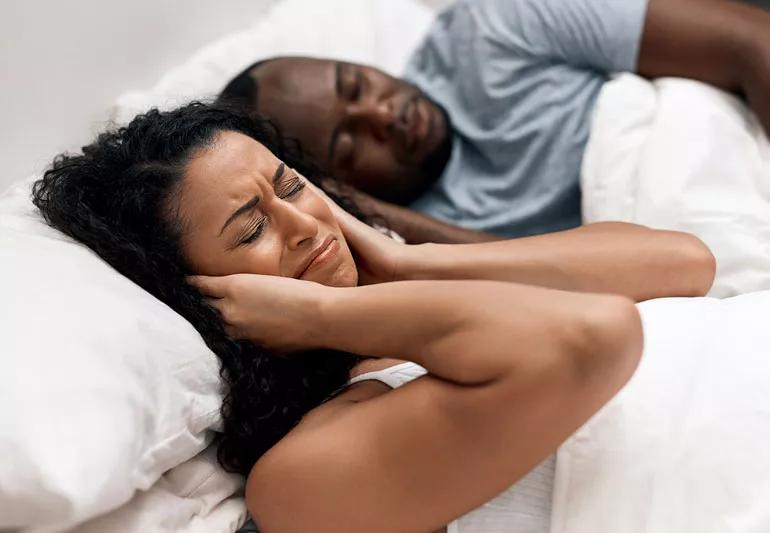Heroic snoring can be associated with obstructive sleep apnea

Image content: This image is available to view online.
View image online (https://assets.clevelandclinic.org/transform/809403f7-c5d8-4fd9-8e81-2d0f5c8eaee8/loudSnoring-942196970-770x553-1_jpg)
woman covering ears while husband snores in bed
That’s not a train horn going off again — it’s your partner’s snoring. Does your partner snore so loud you can hear it two bedrooms away? You might have a heroic snorer in your house.
Advertisement
Cleveland Clinic is a non-profit academic medical center. Advertising on our site helps support our mission. We do not endorse non-Cleveland Clinic products or services. Policy
Heroic snoring is when snores are loud enough that you can hear them through walls.
Although heroic snoring can be frustrating for the person who has to hear it throughout the night, it may signal a serious medical condition, says otolaryngologist and sleep specialist Alan Kominsky, MD.
“It’s important to realize that snoring can be more than just an annoying noise,” says Dr. Kominsky. “It can be associated with obstructive sleep apnea, which is a serious issue that may need to be addressed.”
Obstructive sleep apnea syndrome is a serious disorder that can turn into a major health risk and involves frequent breathing interruptions during the night due to blocked airways. If it’s left untreated, sleep apnea can create an increased risk for stroke, high blood pressure and heart disease.
When your breathing frequently slows down or stops while you’re sleeping, long-term changes can occur that are associated with cardiac, circulation and brain function problems. You’ll also wake up feeling groggy and not rested, which can snowball into not feeling your best throughout your busy days.
“Heroic snoring also can cause sleep disturbances and waking episodes,” says Dr. Kominsky. “These disturbances can prevent the brain from entering the restorative REM sleep stage, leading to mood, memory and concentration problems.”
Advertisement
If you suspect your partner of having sleep apnea, you can try monitoring their sleep patterns. Danger signs are apneic episodes that last more than 10 seconds to 20 seconds. It’s important that your spouse should consult with a doctor if you suspect heroic snoring or obstructive sleep apnea.
In general, snoring happens when the back of the roof of the mouth, called the soft palate, flutters and hits the back of the throat.
“Being overweight, having nasal congestion, breathing through the mouth while sleeping, and using anything sedating before bed, like alcohol or medications, can increase the chances of snoring,” says Dr. Kominsky. “Men are also more prone to snoring.”
To reduce the risk of snoring, try to:
If you live by yourself and don’t know if you snore or not, use a recording device or your smartphone to record your nights. This can help aid your doctor in helping diagnose sleep apnea.
“If all else fails, your dentist can make special dental devices to help separate the tissues in the back of the throat to help reduce the snoring,” he says. “There also are various methods available to stiffen the soft palate, which can help reduce the noise.”
Advertisement

Delivered every Tuesday!
Sign up for our Health Essentials emails for expert guidance on nutrition, fitness, sleep, skin care and more
It's a letter about the news!
Learn more about our editorial process.
Advertisement
Nocturnal lagophthalmos may be caused by damaged nerves or muscles in your face
Break up with your snooze button by shifting your bedtime and establishing a consistent nighttime routine
Keeping a sleep diary and seeing a sleep specialist can help you stay asleep and get the ZZZs you need
Resolve to move a little more, drink a little less, eat a little healthier, sleep a little better and destress a lot
An ice bath can ease sore muscles and decrease inflammation after a workout
Ignoring the warning signs could put you at risk for serious health issues
This social media sleep hack with tart cherry juice and magnesium could be worth a try
Head to bed in a bra to reduce breast pain, nipple irritation and stretch marks
Type 2 diabetes isn’t inevitable with these dietary changes
Applying a hot or cold compress can help with pain
Pump up your iron intake with foods like tuna, tofu and turkey